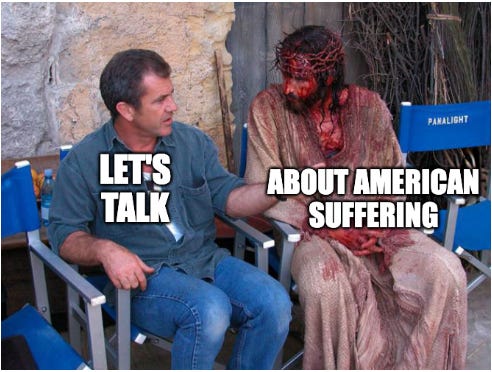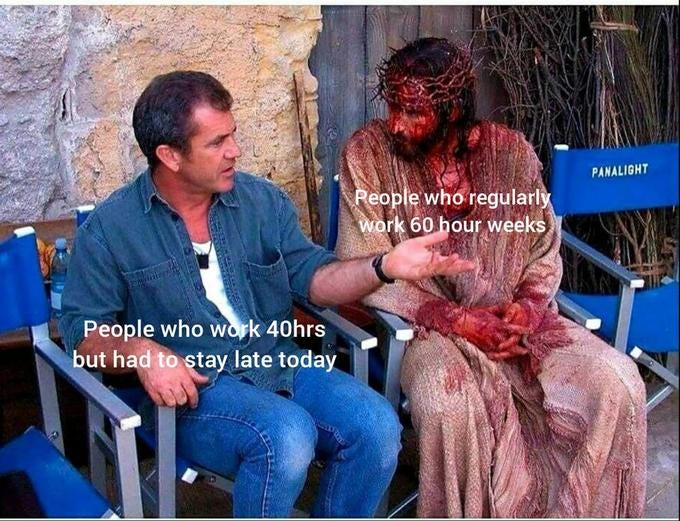I don’t know what Zadie Smith looks like. I’ve never googled her, and I don’t want to know the truth. Instead, I see my own stereotype of the “Black Woman Writer,” one equally composed of the visuals Smith’s writing generates and my own preconceived notions of intellectual women of color in New York City.
She is a grown-up Amanda Gorman with a colorful headwrap and tortoiseshell glasses. She is Lupita N’yongo from the movie 12 Years a Slave but dressed in designer clothes. She is a Kara Walker, the Black artist who paints cut-out silhouettes of southern landscapes and African children on white walls, elegant and tall, aloof, but soft-haired, holding a long-stemmed glass of Bordeaux at the art show.
Zadie Smith (in these above forms) is inside my imagination inside her apartment with two brown children under six and she’s locked down and looking at memes of Mel Gibson conversing with a bloody white body of Jesus Christ. In the image, Mel Gibson is mansplaining his movie production woes to the thorn-crowned Christian prophet.
To anyone else, the meme looks like a metaphor for douchebags, but to Zadie Smith it’s a commentary on privilege and class during a pandemic. Some are upset about no room service, others grieve their dead. This is the power of Zadie Smith— to take the specific and comical and overlay it on the global, the inner, the human, the total experience.
She writes in “The American Exception” that we are in a hellscape, a disaster, and thinking is the only way out. America is so great, so great at everything, even at death— which we view as a series of random personal problems instead of a national collective reality.
“Ethical life depends on meaningfulness,”1 she says.
But in America, meaningfulness is chained to the money tree and whipped with its branch. Death is rarely random and suffering has a hierarchy— that hierarchy is privilege. This is often only seen on the zoom-out, by the other, in the meme; we can’t always identify it when it happens to us internally or externally.
Have you ever recognized your own privilege? When? How?
I remember a moment from my own life. I was leaving a big party at a house in Kampala, Uganda. The house was rented by a few people, including a Ugandan pop singer, a young woman who was something like “Kelly Rowland,” in Destiny’s Child, a star, but not the star. As I was leaving, a mere 23-year-old American, working an entry-level job, but paid in dollars, and not taking care of anyone else, I took a half-drunk glass bottle of beer to finish in the car.
The pop star came running after me up the road, in her heels and cocktail dress. As I got into my wealthy American friend’s SUV, she yelled, “Hey, give me back my empty.”
You see, empty bottles were worth something in Uganda, about a 1/3 of the price of the drink, but it was nothing to me. So, I said no, and rode off, laughing, into the night, onto the next party, the next club, all my friends laughing, already drunk.
“No,” she screamed, “My empty! My empty!”
But the next day I felt guilty. The money from the bottle had meant something to her, but not to me, at least not until it was too late.
Smith offers an example of her own recognition of privilege. Riding the subway, she overhears two working women complaining about a mom giving an iPad to a baby.
“Who would give a baby something that costs $900?” They ask, shaking their heads.
Smith probably gives her kids iPads all the time. Or this is what I imagine along with the perfect interior I’ve created for her Manhattan apartment, a world where nothing is sticky and no one ever gets sick. Don’t we all create these fake realities for the people we follow, for the stars we watch?
Then again, isn’t that like my own house? No one died. We all thrived, baked bread, and complained about the government while floating in our pool.
“Class is a bubble, formed by privilege, shaping and manipulating your conception of reality.”2
Only by comparing ourselves to others, the way we compare Mel Gibson to Jesus Christ, can we begin to understand the world around us.
Don’t roll your eyes at the pain of others, and don’t complain about your iPad’s battery life.
Zadie Smith, Intimations, “The American Exception.”
Zadie Smith, Intimations, “Suffering Like Mel Gibson.”




















Share this post